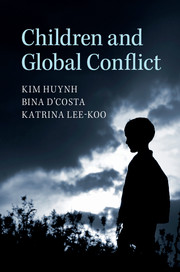Book contents
- Frontmatter
- Dedication
- Contents
- List of abbreviations
- Introduction: why children matter to global conflict
- 1 Children and armed conflict: mapping the terrain
- 2 Children and agency: caretakers, free-rangers and everyday life
- 3 Children and IR: creating spaces for children
- 4 The rights of the child: political history, practices and protection
- 5 Child soldiers: causes, solutions and cultures
- 6 Child forced migrants: bio-politics, autonomy and ambivalence
- 7 Children and peace building: propagating peace
- 8 Children and justice: past crimes, healing and the future
- 9 Who speaks for children? Advocacy, activism and resistance
- Conclusion
- Appendix
- Bibliography
- Index
9 - Who speaks for children? Advocacy, activism and resistance
Published online by Cambridge University Press: 05 May 2015
- Frontmatter
- Dedication
- Contents
- List of abbreviations
- Introduction: why children matter to global conflict
- 1 Children and armed conflict: mapping the terrain
- 2 Children and agency: caretakers, free-rangers and everyday life
- 3 Children and IR: creating spaces for children
- 4 The rights of the child: political history, practices and protection
- 5 Child soldiers: causes, solutions and cultures
- 6 Child forced migrants: bio-politics, autonomy and ambivalence
- 7 Children and peace building: propagating peace
- 8 Children and justice: past crimes, healing and the future
- 9 Who speaks for children? Advocacy, activism and resistance
- Conclusion
- Appendix
- Bibliography
- Index
Summary
I do not intend to return children to murderers because it would not be fair. They do not have the right to have them. So, I will ′rule not to return any children to you. It does not make sense to disturb those children that are in the hands of decent families that will be able to educate them right, not like you educated your children. Only over my dead body will you obtain custody of them.
Introduction
The Argentine Grandmothers with Disappeared Grandchildren was formed in 1977 by grandmothers who organised themselves to locate children taken during Argentina's Dirty War. The children were systematically abducted for adoption by military families and the allies of the regime as part of a plan to control the subversiveness of future generations. The search for the missing children in Argentina, El Salvador, Chile and Guatemala developed one of the most symbolic and effective transnational human rights networks in contemporary history. Keck and Sikkink emphasise that networks are characterised by the prominence of principled ideas and the central role of NGOs. They articulate how grandmothers travelled to Europe, the United States and Canada to denounce human rights violations and to seek international solidarity. The solidarity framework is one of the most important pillars of advocacy and activism among NGOs and other human rights actors, involving ‘relationships between oppressed peoples and those in a position to support them’.
Drawing from Keck and Sikkink's ground-breaking study of advocacy and activism, this chapter explores the norm-setting and framing agenda for children's rights and protection in conflict zones. This chapter seeks to identify some of the factors mobilising global and local movements in responding to children's concerns in conflict zones. It considers the initiatives used to protect children from abuse and exploitation in various regions, and the tensions that exist within advocacy and activism for children, especially with regard to the political processes and shifting dynamics of conflict zones.
- Type
- Chapter
- Information
- Children and Global Conflict , pp. 249 - 281Publisher: Cambridge University PressPrint publication year: 2015



